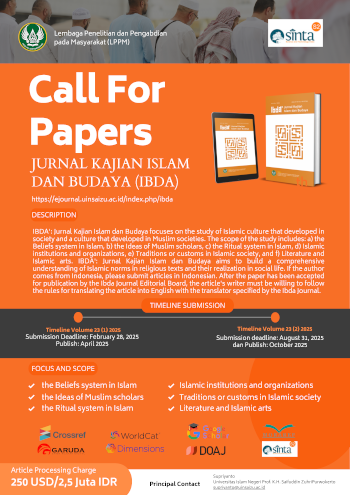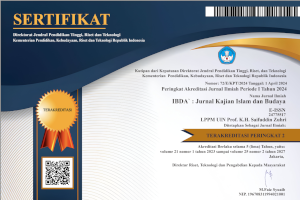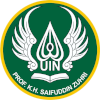Local Islam and Javanese Culture Penetration: Muslim Alif Rebo Wage (Aboge) Negotiations in Identity Formation
DOI:
https://doi.org/10.24090/ibda.v20i1.6386Keywords:
Aboge, Identity Negotiation, Penginyongan, Dialect, JavaAbstract
This article aims to explain the efforts of Aboge Muslims as a group that gains penetration from mainstream culture to negotiate their identity. Aboge (Alif Rebo Wage) is a Muslim group in Java that has a Kejawen Islamic identity. In Banyumas District, Central Java, the Aboge identity was built based on the Penginyongan culture whose position is a subculture of Javanese. Using a critical paradigm with the theoretical approach of genetic structuralism developed by Pierre Bourdieu, this article shows that Aboge identity negotiations are carried out by capitalizing on the Penginyongan culture as a locality that has a strategy in the era of regional and village autonomy. The result of this study reveals that Aboge takes the space left by the Banyumasan community because it is inferior to standard Javanese. This is because Penginyongan culture, which includes language, tradition, and religion, tends to be positioned as marginal, assumed to be deviant, and misrepresented. Standard culture uses the instrument of power that is owned to maintain its dominance through the formation of a stratified structure. This structure is used to distribute other variations at different positions with the epicenter point filled by the standard culture. In the context of language, bandek Javanese (Yogyakarta and Solo) is the standard, outside of which includes the North Coast, East Java, and Banyumasan are dialects. Locality gained momentum during the period of regional and village autonomy which demanded its development to explore and accommodate local culture. Aboge with Penginyongan identity then becomes a manifestation that represents locality.Downloads
Download data is not yet available.
References
Ahmad Muttaqin, I. N. A. (2017). Varian Islam dalam Masyarakat Banyumas (p. 137). IAIN Purwokerto.
Appadurai, A. (1996). Modernity at Large, Cultural Dimensions of Globalization (vol 1). University of Minnesota Press.
Baris Isci Pembeci. (2020). Religion and the Construction of Ethnic Identity in Kyrgyzstan. Region, 6(1), 133–152.
Berlejung, A. (2019). Identity Performances in Multilinguistic Contexts. Die Welt Des Orients, 49(2), 252–287. https://doi.org/10.13109/wdor.2019.49.2.252
Bourdieu, P. (1996). Distinction A Social Critique of the Judgement of Taste. Harvard University Press.
Cris Lyttleton, D. S. (2011). Cultural Reproduction of Minority Sexuality; Intimate Change among Ethnic Akha in the Upper Mekong. Asian Studies Review, 25, 170–185.
Darusuprapta. (1986). Periodisasi Sastra Jawa berdasarkan Sejarah Sastra Jawa. Balai Penelitian Bahasa Yogyakarta.
Eriyanto. (2009). Analisis Wacana, Pengantar Analisis Teks Media. LKiS.
Foucault, M. (1994). The Archaeology of Knowledge, Translated From the French by A. M. Sheridan Smith. In Vintage Books. Vintage Books.
Fringka, Y. (2016). Resistensi Berbasis Adat; Perlawanan Masyarakat Nagari Koto Tanah datar Sumatera Barat terhadap Tambang Bukit Batubasi. Masyarakat Jurnal Sosiologi, 21(2).
Geertz, C. (1983). Abangan, Santri, Priyayi dalam Masyarakat Jawa. Pustaka Jaya.
Gordon, C., & (Ed). (1980). Power/Knowledge Selected Interviews and Other Writings 1972-1977 Michel Foucault. In C.
Gordon (Ed.), Panthoen Books (Panthoen B). Panthoen Books. https://doi.org/10.1007/978-1-4614-5583-7_438
Hefner, R. W. (2083). Ritual and Cultural Reproduction in Non-Islamic Java. American Ethnologist, 10(4), 665–683.
Jodamus, J. (2017). Make the Circle Bigger: Alternate Discourses of Identity Construction in Black Theologies. Journal for the Study of Religion, 30(2), 207–227.
Jones, J. A. (2011). Who are we? Producing group identity through everyday practices of conflict and discourse. Sociological Perspectives, 54(2), 139–161. https://doi.org/10.1525/sop.2011.54.2.139
Junus, F. G. (2019). VARIASI BAHASA DALAM SOSIAL MEDIA : SEBUAH KONSTRUKSI IDENTITAS. 366–372.
Kokaislová, P. K. and P. (2019). The Ethnic Identity of Turkmenistan’s Baloch. Asian Ethnology, 78(1), 181–196.
Kunovich, R. M. (2017). Perceptions of Racial Group Size in a Minority-Majority Area. Sociological Perspectives, 60(3), 479–496. https://doi.org/10.1177/0731121416675869
Kurniati, E., & Mardikantoro, H. . (2010). Pola Variasi Bahasa Jawa (Kajian Sosiodialektologi pada Masyarakat Tutur di Jawa Tengah). Humaniora, 22(3), 273–284. https://journal.ugm.ac.id/jurnal-humaniora/article/view/1001/832.
Magnis-Suseno, F. (1985). Etika Jawa, Sebuah Analisa Falsafi tentang Kebijakan Hidup Jawa. Gramedia.
Metafisika, D. P., & Gadamer, H. (2016). Tingkatan Bahasa Jawa dalam Perspektif Metafisika Hans-Georg Gadamer. Jurnal Filsafat, 21(3), 224–239.
Noorhaidi Hasan, & Munirul Ikhwan. (2017). Membaca Kebaikan Bersama Masa Mataram Islam (p. 206). PPS UIN Sunan Kalijaga.
Parasecoli, F. (2014). Food, identity, and cultural reproduction in immigrant communities. Social Research, 81(2), 415–439. https://doi.org/10.1353/sor.2014.0015
Pasha, M. K. (2001). Globalisation, Islam, and Resistance. In Globalization and The Politics of Resistance (pp. 240–271).
Piazza, J. A. (2011). Poverty, minority economic discrimination, and domestic terrorism. Journal of Peace Research, 48(3), 339–353. https://doi.org/10.1177/0022343310397404
Pierre Bourdieu. (1992). The logic of practice. In Stanford University Press. Stanford University Press. https://doi.org/10.4324/9781003115083-9
Pigeaud, T. (1971). Literature of Java. In Archipel (Vol. 1). SPRINGER-SCIENCE+BUSINESS MEDIA, B.V.
Prawiro, A. M. B. (2014). Islam Aboge: Islam and Cultural Java Dialogue (A Study of Islam Aboge Communities in Ujungmanik, Cilacap, Central Java, Indonesia). International Journal of Nusantara Islam, 1(2), 102–117. https://doi.org/10.15575/ijni.v1i2.29
Priyadi, S. (2007). Cablaka Sebagai Inti Model Karakter Manusia Banyumas. Diksi, 14(1), 11–18.
Ramadhan, H. R., & Masykur, A. M. (2018). Membaca Cablaka (Sebuah Studi Fenomenologis Pada Budaya Penginyongan. Empati, 7(3), 100–110.
Roni Factor, Ichiro Kawachi, D. R. W. (2011). Understanding High-Risk Behavior among Non-Dominan Minorities; a Social Resistance Framework. American Public Health, 73(12), 1290-1299.
Saeed, H. (2019). Iraqi Shi’is and the Pressure of Religious Identity: An Attempt to Determine the Meaning of Shi’i Identity. Al Muntaqa, 2(1), 62–80.
Sholikhah, I. M., Adiarti, D., & Kholifah, A. N. (2017). Local Wisdom Reflected in The Symbols in Masjid Saka Tunggal Banyumas. IBDA` : Jurnal Kajian Islam Dan Budaya, 15(1), 165–178. https://doi.org/10.24090/ibda.v15i1.762
Smith, J. M. (2013). Creating a godless community: The collective identity work of contemporary American atheists. Journal for the Scientific Study of Religion, 52(1), 80–99. https://doi.org/10.1111/jssr.12009
Tileagă, M.-E. M. and C. (2011). The construction of ethnic minority identity: A discursive psychological approach to ethnic self-definition in action. Discourse & Society, 22(1), 86–101.
Wedhawati, D. (2006). Tata Bahasa Jawa Mutakhir. Pustaka Pelajar.
Weigert, A. J., The, S., Quarterly, S., Summer, N., & Weigert, A. J. (1986). The Social Production of Identity : Metatheoretical Foundations. The Sociological Quarterly, 27(2), 165–183.
Wilcox-Archuleta, B. (2018). Local Origins: Context, Group Identity, and Politics of Place. Political Research Quarterly, 71(4), 960–974. https://doi.org/10.1177/1065912918772933
Wolfgang Detel. (1998). Foucault and Classical Antiquity, Power, Ethics and Knoledge. In International Philosophical Quarterly (Vol. 46, Issue 1). Cambridge University Press. https://doi.org/10.5840/ipq200646159
Woodward, M. (2011). Java, Indonesia and Islam. In Springer. Springer. https://doi.org/10.1007/978-94-007-0056-7_8
Appadurai, A. (1996). Modernity at Large, Cultural Dimensions of Globalization (vol 1). University of Minnesota Press.
Baris Isci Pembeci. (2020). Religion and the Construction of Ethnic Identity in Kyrgyzstan. Region, 6(1), 133–152.
Berlejung, A. (2019). Identity Performances in Multilinguistic Contexts. Die Welt Des Orients, 49(2), 252–287. https://doi.org/10.13109/wdor.2019.49.2.252
Bourdieu, P. (1996). Distinction A Social Critique of the Judgement of Taste. Harvard University Press.
Cris Lyttleton, D. S. (2011). Cultural Reproduction of Minority Sexuality; Intimate Change among Ethnic Akha in the Upper Mekong. Asian Studies Review, 25, 170–185.
Darusuprapta. (1986). Periodisasi Sastra Jawa berdasarkan Sejarah Sastra Jawa. Balai Penelitian Bahasa Yogyakarta.
Eriyanto. (2009). Analisis Wacana, Pengantar Analisis Teks Media. LKiS.
Foucault, M. (1994). The Archaeology of Knowledge, Translated From the French by A. M. Sheridan Smith. In Vintage Books. Vintage Books.
Fringka, Y. (2016). Resistensi Berbasis Adat; Perlawanan Masyarakat Nagari Koto Tanah datar Sumatera Barat terhadap Tambang Bukit Batubasi. Masyarakat Jurnal Sosiologi, 21(2).
Geertz, C. (1983). Abangan, Santri, Priyayi dalam Masyarakat Jawa. Pustaka Jaya.
Gordon, C., & (Ed). (1980). Power/Knowledge Selected Interviews and Other Writings 1972-1977 Michel Foucault. In C.
Gordon (Ed.), Panthoen Books (Panthoen B). Panthoen Books. https://doi.org/10.1007/978-1-4614-5583-7_438
Hefner, R. W. (2083). Ritual and Cultural Reproduction in Non-Islamic Java. American Ethnologist, 10(4), 665–683.
Jodamus, J. (2017). Make the Circle Bigger: Alternate Discourses of Identity Construction in Black Theologies. Journal for the Study of Religion, 30(2), 207–227.
Jones, J. A. (2011). Who are we? Producing group identity through everyday practices of conflict and discourse. Sociological Perspectives, 54(2), 139–161. https://doi.org/10.1525/sop.2011.54.2.139
Junus, F. G. (2019). VARIASI BAHASA DALAM SOSIAL MEDIA : SEBUAH KONSTRUKSI IDENTITAS. 366–372.
Kokaislová, P. K. and P. (2019). The Ethnic Identity of Turkmenistan’s Baloch. Asian Ethnology, 78(1), 181–196.
Kunovich, R. M. (2017). Perceptions of Racial Group Size in a Minority-Majority Area. Sociological Perspectives, 60(3), 479–496. https://doi.org/10.1177/0731121416675869
Kurniati, E., & Mardikantoro, H. . (2010). Pola Variasi Bahasa Jawa (Kajian Sosiodialektologi pada Masyarakat Tutur di Jawa Tengah). Humaniora, 22(3), 273–284. https://journal.ugm.ac.id/jurnal-humaniora/article/view/1001/832.
Magnis-Suseno, F. (1985). Etika Jawa, Sebuah Analisa Falsafi tentang Kebijakan Hidup Jawa. Gramedia.
Metafisika, D. P., & Gadamer, H. (2016). Tingkatan Bahasa Jawa dalam Perspektif Metafisika Hans-Georg Gadamer. Jurnal Filsafat, 21(3), 224–239.
Noorhaidi Hasan, & Munirul Ikhwan. (2017). Membaca Kebaikan Bersama Masa Mataram Islam (p. 206). PPS UIN Sunan Kalijaga.
Parasecoli, F. (2014). Food, identity, and cultural reproduction in immigrant communities. Social Research, 81(2), 415–439. https://doi.org/10.1353/sor.2014.0015
Pasha, M. K. (2001). Globalisation, Islam, and Resistance. In Globalization and The Politics of Resistance (pp. 240–271).
Piazza, J. A. (2011). Poverty, minority economic discrimination, and domestic terrorism. Journal of Peace Research, 48(3), 339–353. https://doi.org/10.1177/0022343310397404
Pierre Bourdieu. (1992). The logic of practice. In Stanford University Press. Stanford University Press. https://doi.org/10.4324/9781003115083-9
Pigeaud, T. (1971). Literature of Java. In Archipel (Vol. 1). SPRINGER-SCIENCE+BUSINESS MEDIA, B.V.
Prawiro, A. M. B. (2014). Islam Aboge: Islam and Cultural Java Dialogue (A Study of Islam Aboge Communities in Ujungmanik, Cilacap, Central Java, Indonesia). International Journal of Nusantara Islam, 1(2), 102–117. https://doi.org/10.15575/ijni.v1i2.29
Priyadi, S. (2007). Cablaka Sebagai Inti Model Karakter Manusia Banyumas. Diksi, 14(1), 11–18.
Ramadhan, H. R., & Masykur, A. M. (2018). Membaca Cablaka (Sebuah Studi Fenomenologis Pada Budaya Penginyongan. Empati, 7(3), 100–110.
Roni Factor, Ichiro Kawachi, D. R. W. (2011). Understanding High-Risk Behavior among Non-Dominan Minorities; a Social Resistance Framework. American Public Health, 73(12), 1290-1299.
Saeed, H. (2019). Iraqi Shi’is and the Pressure of Religious Identity: An Attempt to Determine the Meaning of Shi’i Identity. Al Muntaqa, 2(1), 62–80.
Sholikhah, I. M., Adiarti, D., & Kholifah, A. N. (2017). Local Wisdom Reflected in The Symbols in Masjid Saka Tunggal Banyumas. IBDA` : Jurnal Kajian Islam Dan Budaya, 15(1), 165–178. https://doi.org/10.24090/ibda.v15i1.762
Smith, J. M. (2013). Creating a godless community: The collective identity work of contemporary American atheists. Journal for the Scientific Study of Religion, 52(1), 80–99. https://doi.org/10.1111/jssr.12009
Tileagă, M.-E. M. and C. (2011). The construction of ethnic minority identity: A discursive psychological approach to ethnic self-definition in action. Discourse & Society, 22(1), 86–101.
Wedhawati, D. (2006). Tata Bahasa Jawa Mutakhir. Pustaka Pelajar.
Weigert, A. J., The, S., Quarterly, S., Summer, N., & Weigert, A. J. (1986). The Social Production of Identity : Metatheoretical Foundations. The Sociological Quarterly, 27(2), 165–183.
Wilcox-Archuleta, B. (2018). Local Origins: Context, Group Identity, and Politics of Place. Political Research Quarterly, 71(4), 960–974. https://doi.org/10.1177/1065912918772933
Wolfgang Detel. (1998). Foucault and Classical Antiquity, Power, Ethics and Knoledge. In International Philosophical Quarterly (Vol. 46, Issue 1). Cambridge University Press. https://doi.org/10.5840/ipq200646159
Woodward, M. (2011). Java, Indonesia and Islam. In Springer. Springer. https://doi.org/10.1007/978-94-007-0056-7_8
Downloads
Published
2022-06-01
How to Cite
Muttaqin, A., & Noor, N. M. (2022). Local Islam and Javanese Culture Penetration: Muslim Alif Rebo Wage (Aboge) Negotiations in Identity Formation. IBDA` : Jurnal Kajian Islam Dan Budaya, 20(1), 110–130. https://doi.org/10.24090/ibda.v20i1.6386
Issue
Section
Articles
License
Copyright (c) 2022 Ahmad Muttaqin, Nina Mariani Noor

This work is licensed under a Creative Commons Attribution-ShareAlike 4.0 International License.
Authors who publish with this journal agree to the following terms:
- Authors retain copyright and grant the journal right of first publication with the work simultaneously licensed under a Creative Commons Attribution-ShareAlike License a that allows others to share the work with an acknowledgement of the work's authorship and initial publication in this journal.
- Authors are able to enter into separate, additional contractual arrangements for the non-exclusive distribution of the journal's published version of the work (e.g., post it to an institutional repository or publish it in a book), with an acknowledgment of its initial publication in this journal.
- Authors are permitted and encouraged to post their work online (e.g., in institutional repositories or on their website) before and during the submission process, as it can lead to productive exchanges, as well as earlier and greater citation of published work (See The Effect of Open Access).















